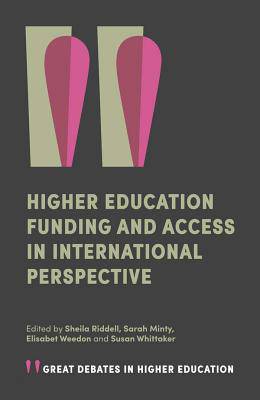
- Afhalen na 1 uur in een winkel met voorraad
- Gratis thuislevering in België vanaf € 30
- Ruim aanbod met 7 miljoen producten
- Afhalen na 1 uur in een winkel met voorraad
- Gratis thuislevering in België vanaf € 30
- Ruim aanbod met 7 miljoen producten
Zoeken
Higher Education Funding and Access in International Perspective
€ 66,45
+ 132 punten
Omschrijving
This book explores the way in which the pressures of globalisation are shaping higher education funding and access across the world. Higher education is seen as a way of developing human capital and building knowledge economies, but major debates continue about who should attend university; how the costs of higher education should be distributed between the individual student and the state; how students from non-traditional backgrounds can be helped to succeed in higher education; and the intended and unintended consequences of widening access initiatives.
Globalisation is not a uni-directional force, but is accompanied by movements to reinforce the local and the regional, often driven by fears of loss of identity. Universities across the world have become more powerful and autonomous from the state, but at the same time students as consumers of education have an increasingly powerful voice. They frequently find themselves in opposition to the business model which infuses higher education systems and student protests have had a strong influence on policy development. This book explores the way in which the twin pressures of globalisation and localisation play out in higher education across the developed world, often reflected in more specific debates on fees regimes, access and culture.
Globalisation is not a uni-directional force, but is accompanied by movements to reinforce the local and the regional, often driven by fears of loss of identity. Universities across the world have become more powerful and autonomous from the state, but at the same time students as consumers of education have an increasingly powerful voice. They frequently find themselves in opposition to the business model which infuses higher education systems and student protests have had a strong influence on policy development. This book explores the way in which the twin pressures of globalisation and localisation play out in higher education across the developed world, often reflected in more specific debates on fees regimes, access and culture.
Specificaties
Betrokkenen
- Uitgeverij:
Inhoud
- Aantal bladzijden:
- 280
- Taal:
- Engels
- Reeks:
Eigenschappen
- Productcode (EAN):
- 9781787546547
- Verschijningsdatum:
- 9/05/2018
- Uitvoering:
- Paperback
- Formaat:
- Trade paperback (VS)
- Afmetingen:
- 127 mm x 196 mm
- Gewicht:
- 217 g

Alleen bij Standaard Boekhandel
+ 132 punten op je klantenkaart van Standaard Boekhandel
Beoordelingen
We publiceren alleen reviews die voldoen aan de voorwaarden voor reviews. Bekijk onze voorwaarden voor reviews.










